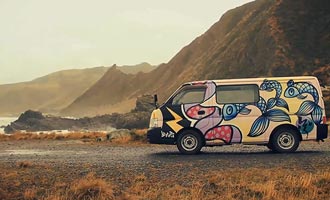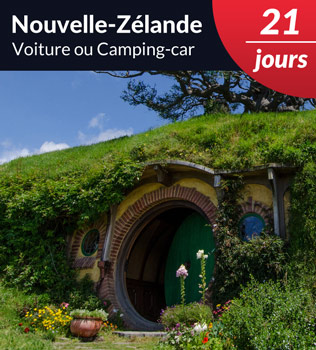
Car or Motorhome Rental in New Zealand?
Please contact us and we will help you to organize your trip! It's free and without commitment.
- Read the post
- Details
- Advices
Presentation.
- 1Is Driving Easy in the Country?
- 2Should I Travel by Car?
- 3Should You Prefer a Motorhome or Camper-Van?
- 4Should You Consider Domestic Flights?
- 5How About a Train Trip?
- 6Some Tips for the Ferry and Navigation in New Zealand.
- 7How About Buses to Save Money?
- 8Is It Possible to Travel by Bicycle?
- 9Is It Possible to Travel on Foot or Hitchhiking?
- 10Car or Motorhome?
Is Driving Easy in the Country?
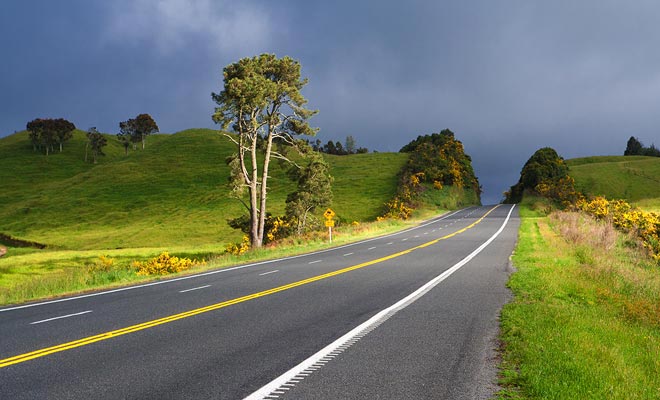
The panorama should not make you forget to drive to the left.
The choice of the mode of transport in New Zealand is primarily a matter of budget. The scenery is absolutely gorgeous and gasoline is less expensive than in Europe!
The country covers about 1600 km, and it takes more than two days to reach Christchurch from Auckland. Fortunately, the New Zealand road network is in excellent condition. There are 52 000 km of asphalted roads and 42,000 km of gravel roads sometimes restricted to 4x4 vehicles.
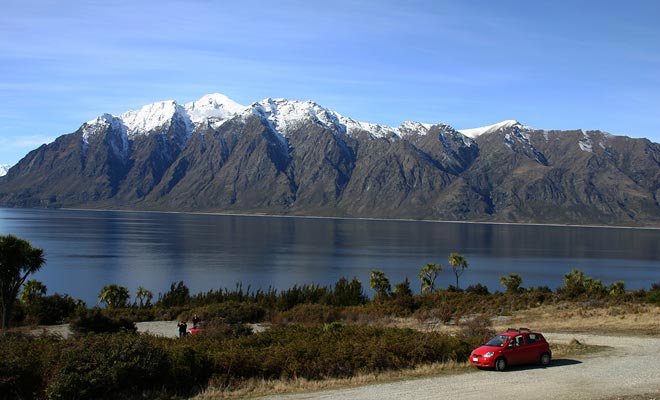
The road network in excellent condition allows to enjoy the landscape.
The New Zealand is a hilly country where there are few two-lane motorways. That's why the speed limits outside urban areas are set at 100 km/h. One must remain vigilant and resist the temptation to accelerate, because the radar controls are common.
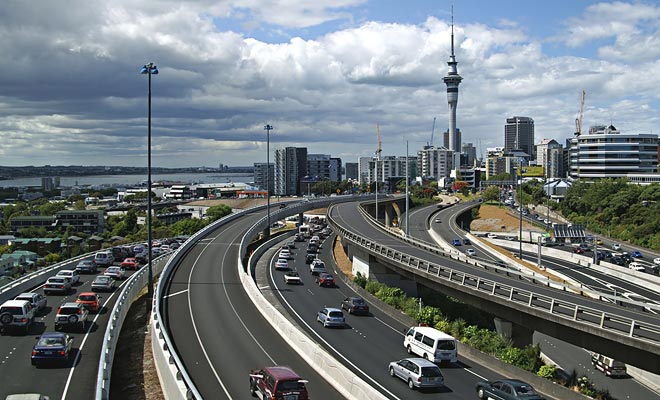
Traffic congestion exists only in large cities.
Traffic jams that are formed during office hours disappear as soon as you leave the big cities. Traffic is incredibly fluid, but driving on the left requires some time to adapt. Reading our article on the safety rules is strongly recommended before embarking on the road.
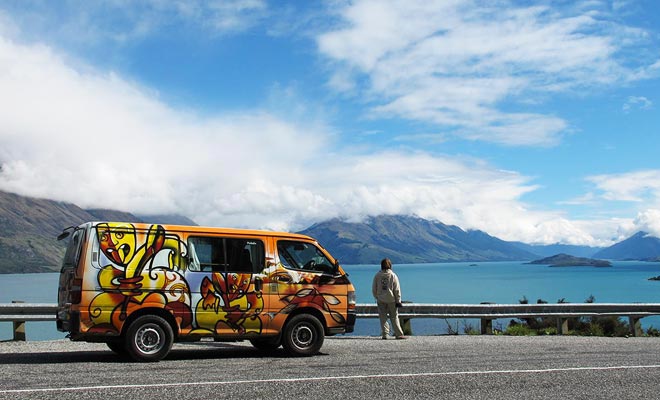
The choice of vehicle is a matter of personality.
Should one rent a car or a motorhome to visit the country? This is the question that everyone is asking when preparing a stay in New Zealand. But there are other options such as the train, bus or plane. The more adventurous can even consider traveling by bike or on foot during long hikes such as the Te Araroa
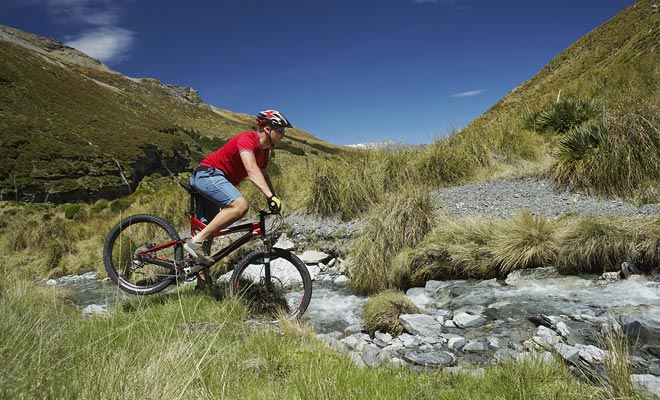
Renting a mountain bike is highly recommended during the stay.
I will present all means of transportation available to you. A summary of the pros and cons of each solution should help you to make your choice. If you still need help to make up your mind, I will give you my opinion at the end of the article.
Should I Travel by Car?
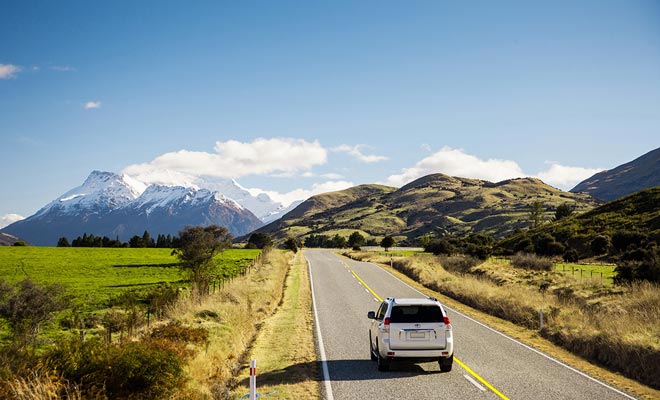
If you have never driven to the left, prefer the car.
Car rental agencies engage in fierce competition in New Zealand. When looking for the best deal, you can expect to find the cheapest price around $15 per day. But in practice, it is far better to rent a vehicle at around $30 per day.
In New Zealand, low price rhymes with bad Japanese cars: the market is saturated with their old models from the 90s, with a poor quality usually. I consider that saving $150 on a stay while sacrificing comfort and safety is not reasonable. Remember that you will drive thousands of kilometers in a foreign land!
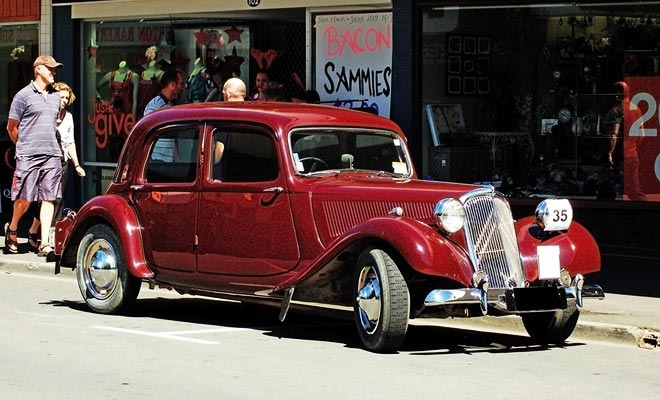
New Zealanders are passionate about old cars.
Some unpleasant surprises are possible: the manual gearbox booked on the Internet can prove to be an automatic one, once on-site. However, and given the long distances, an automatic gearbox and a cruise control are essential. But be careful not to rent a cheap vehicle. The hilly terrain usually increases gasoline consumption dramatically if the gear ratios are poorly managed by a bad automatic gearbox.
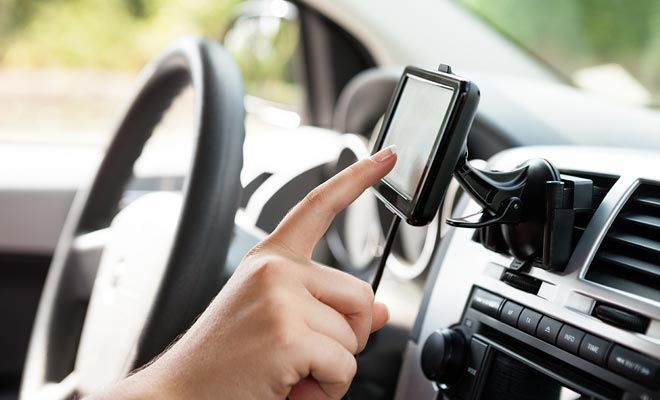
The GPS is rented on site but you can bring your own.
Don't forget your international driver's license, and take your GPS or rent it for a few dollars a day.
Some rental companies refuse drivers under 21 years. Others may charge a supplement.
Finally, if you stay more than three months in the country, you should consider buying your own car.
The models of the 90s cost only an average price of $2100.
Benefits of the car
- Cheap rentals.
- Gasoline cheaper than in Europe.
- Frequent gas stations.
- Easy parking.
- Ease to cross narrow bridges.
- No need to pay the ferry, you will change your vehicle on each island.
Disadvantages of the car
- Having to load the luggage in the trunk every day.
- Renting a 4x4 is more expensive than a car.
Should You Prefer a Motorhome or Camper-Van?
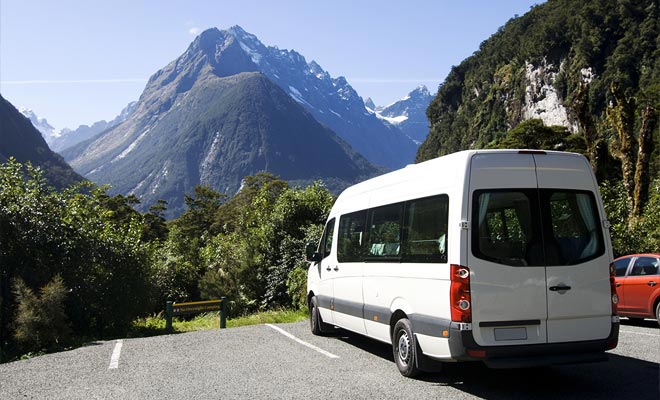
The motorhome is ideal if you have some experience.
New Zealand has the reputation of being the country of the camper par excellence. This is statistically the preferred transport solution for tourist visitors, but it still has some flaws to be considered.
The major advantage of the camper is to allow you to adapt your itinerary according to your desires. In case of bad weather, you can change your plans and reach asunnier location. The country is remarkably laid out with more than 200 campsites specifically designed to accommodate such vehicles.
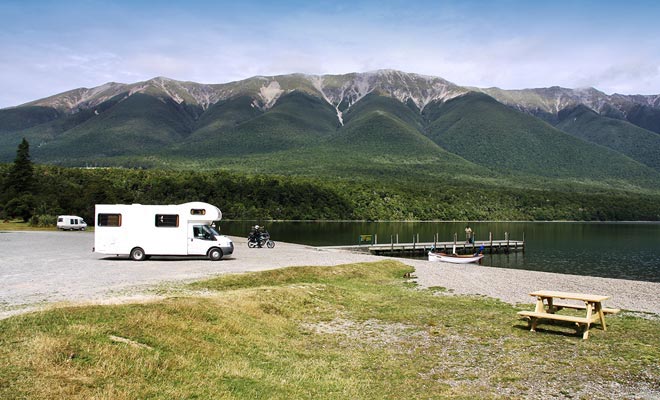
The motorhome brings freedom but also constraints.
However, to drain or fill a drinking water tank will not please everyone.
A motorhome choice is essentially justified if you want to save money. But one must still beware of incidentals!
The high demand during the high season is accompanied by a surge in prices.
It becomes essential to book his camping for a long time in advance, or you will end up with a bill that exceeds the price of a car with hotel nights.
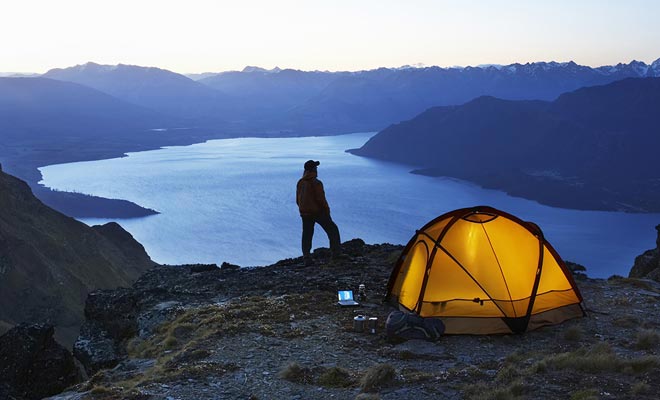
Freedom camping is allowed in specific locations.
There are places to park for free, but they are often located on the fringes of the tourist places. Some allow you to connect the vehicle to power supply, others are more spartan and necessarily cheaper. Check out my article on the different types of accommodations to study the issue in detail.
Advantages of the camper
- More economical (if the budget is under control).
- Many free campsites.
- Affordable gasoline.
- Frequent gas stations.
- Free itinerary.
- Possibility to escape the bad weather.
- Not having to unpack luggage at every step.
- More flexibility than true freedom.
Disadvantages of the camper
- Higher fuel consumption.
- Extra $270 for a ferry crossing.
- Maintenance at your expense.
- Connection to power supply is not free.
- Driving can be more delicate for beginners.
- Parking more difficult.
- Concentration required to cross some bridges.
Should You Consider Domestic Flights?
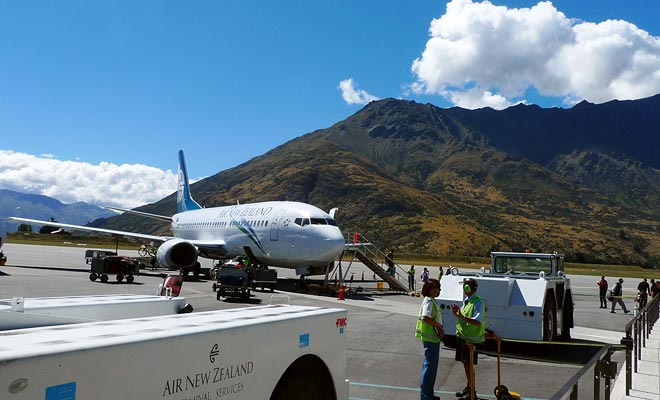
Domestic flights are affordable if you book in advance.
There are many airports throughout the country (fifteen on each island), but only those in Auckland and Christchurch welcome flights from Europe.
Domestic flights are relatively inexpensive and can be useful during your stay. Provided you book at least four months in advance, you can enjoy very competitive rates. Here are some examples to give you an idea:
| FLIGHT (ONE WAY) | ESTIMATE PRICE |
|---|---|
| Auckland - Christchurch | 92 NZD |
| Auckland - Wellington | 68 NZD |
| Auckland - Queenstown | 98 NZD |
| Auckland - Dunedin | 152 NZD |
| Auckland - Rotorua | 198 NZD |
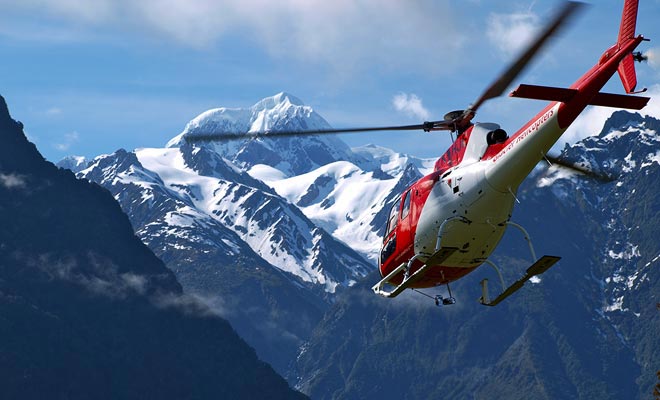
The sightseeing flights are spectacular but off-price.
A domestic flight is often cheaper than the rental of a vehicle (with gasoline to pay) over several days.
For example, a flight between Queenstown and Wellington is much shorter and also very interesting financially if you do not want to visit the West Coast.
Apart the classic domestic flights, you can also book sightseeing flights of short duration and generally overpriced. However, a flight over the Bay of Islands, the Fox Glacier, White Island or Kaikoura is an extraordinary experience if you have the means...
Advantages of the plane
- Easier access to remote tourist areas.
- Reduced travel time.
- Possibility to admire the country from the sky.
- Absence of black companies in New Zealand.
Disadvantages of the plane
- A price can be high during the high season.
- Necessity to book well in advance.
How About a Train Trip?

There are still some train lines open to travelers.
Contrary to what one might think, a journey by train is one of the best ways to enjoy the country panoramas. The commercial lines were almost all closed in the past decades, but some tourist lines remain.
Speed is paradoxically the main advantage and the major drawback of a New Zealand trip by train. One can enjoy the scenery in special panorama wagons while listening excellent audio commentaries.
However, one must not be in a hurry, because a basic Auckland-Wellington journey takes approximately 12 hours to complete, with stops planned at every station!
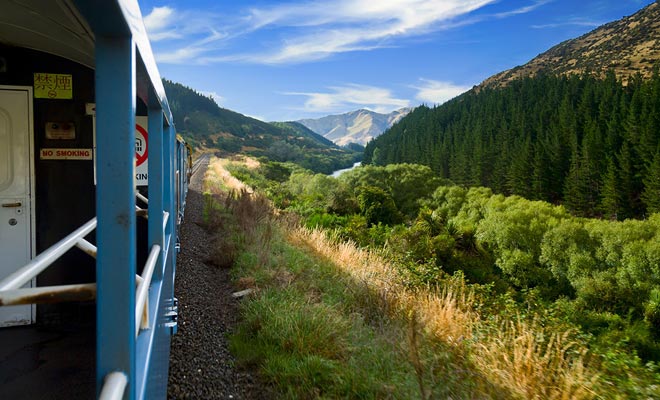
The train routes are among the most beautiful in the world.
Under these conditions, there is usually a single departure every the day, and the train leaves the railway station early in the morning to arrive late in the evening.
The TranzAlpine line is often quoted as being the most beautiful in the world. This old railway connects Christchurch to Greymouth through the Canterbury Plains and the Southern Alps.
Another fantastic trip is the Taieri Gorge Railway departing from Dunedin. It borrows viaducts overlooking spectacular gorges covered by yellow flowers.
Advantages of the train
- The spectacular itineraries.
- Special panorama wagons.
Disadvantages of the train
- Very slow (stops at every station).
- Very early departure.
- Late evening arrival.
Some Tips for the Ferry and Navigation in New Zealand.
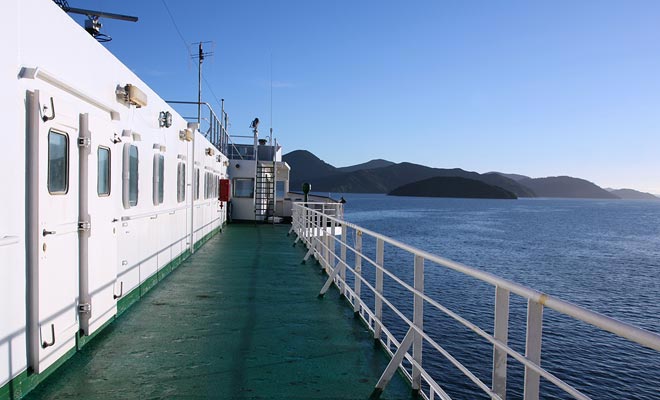
The ferry connects the North Island to the South.
The majority of tourists borrow the ferry to go from North Island to South Island (and vice versa). With several daily departures, it takes 3 h 15 to complete a crossing.
Interislander and Blue Bridgeshare the market with similar fares for passengers (about $65). If you travel by car, you may return your vehicle to the rental company before boarding. You will rent another vehicle at the arrival on the other side, and this might cost less than paying the transport of your car in the ferry hold.
Alas, travelers in camper-vans can't use this tip and they will have to pay an extra of $270 for the crossing with their vehicle!
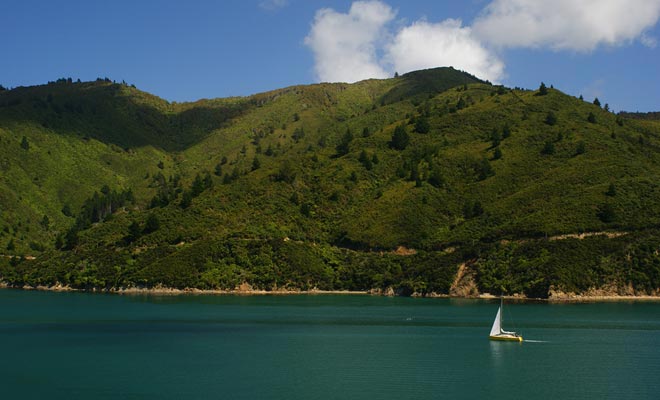
The landscapes become majestic when approaching the South Island.
The trip in itself is quite comfortable. You can get some sleep on the benches, or kill your free time at the bar, waiting for the last half hour of the trip.
When the ferry is about to reach Picton on the South Island, you should climb on the top bridge to admire the scenery (the wind is strong, even in summer so consider wearing a sweater).
Do not forget your medication if you are prone to seasickness (however, the ferry is so big, it's quite stable). Medication will also be useful if you join a whale-watching tour in the Kaikoura Peninsula.
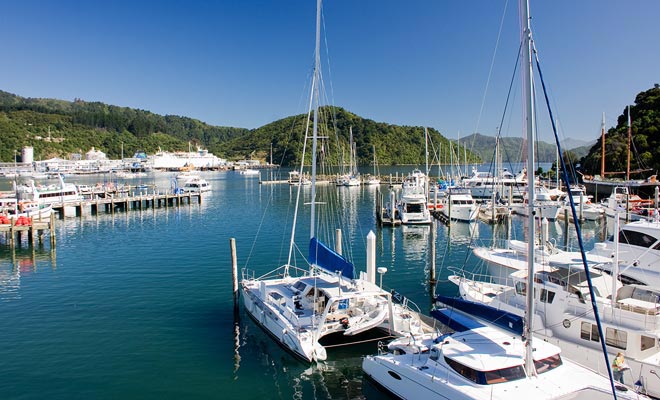
Go exploring deserted islands aboard a sailing boat.
If you have sea legs, you can even consider renting a small boat for exploring the 144 islands of the Bay of Islands. The Abel Tasman National Park is to be explored by kayak, but convenient water taxis can also be booked. Check the activities section on Kiwipal to organize these excursions.
Advantages of the ferry
- Several departures a day.
- Possibility to board with a vehicle.
- Rapid Crossing
- Leisure and catering on board.
- Wonderful landscapes.
Disadvantages of the ferry
- Extra charges for boarding a vehicle.
- Can be boring except when approaching Picton.
How About Buses to Save Money?

The bus is only a good deal for long stays.
New Zealand public buses serve nearly 600 towns and villages.
Intercity Coachlines and Naked Bus are the two main companies that offer to book on the Internet.
As tourists, should one travel by bus during a few weeks' stay? This mode of transport is especially suitable for students holding a WHV (Working Holiday Visa) and passing from a farm job to another.

Seasonal workers travel mainly by bus.
The Kiwi Experience bus company is especially targeting this clientele. Special yearly loyalty cards are meant to accumulate points to gain substantial discounts.
It is a kind of tourist bus that travels through the entire country and helps to meet with other foreign students in a festive atmosphere on board.
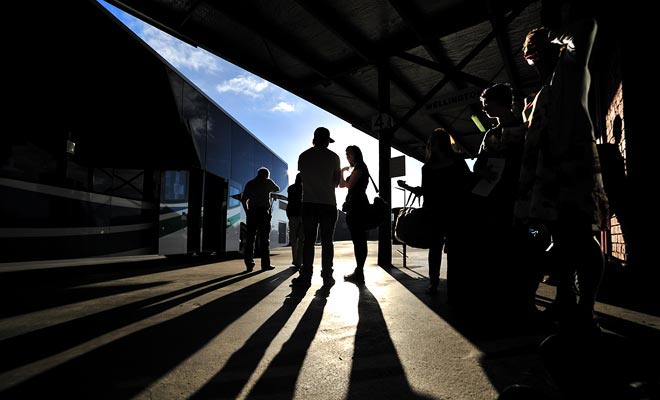
The transport of luggage by bus is far from ideal.
But if you just want to travel occasionally or in total freedom, the bus is finally too expensive and can't be considered as a valid alternative to car or camper-van rental.
I will not speak of the downtown buses as it's not the subject here. The quality is variable and you will surely have the opportunity to borrow one in Auckland or Wellington for a few dollars a trip.
Advantages of the bus
- Extensive bus network.
- Economic if you travel often.
- Meeting other students.
- Dynamic atmosphere on board.
Disadvantages of the bus
- Booking is essential in summer.
- Schedules not precise.
- Comfort reduced.
- Management of luggage is more difficult.
- Often noisy on board.
- Less autonomy.
Is It Possible to Travel by Bicycle?
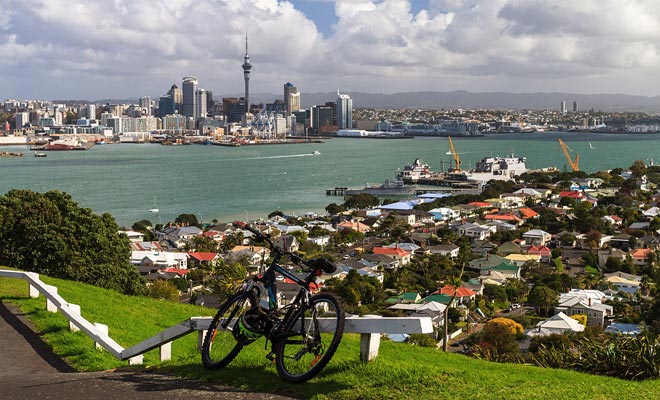
A bike track crosses the country from north to south.
The bike trails are numerous in the country, but going from one city to another usually involved pedalling on the roadside. As New Zealanders do not always respect the safety distances, the helmet is mandatory under penalty of fine.
The construction of the New Zealand's Cycle Trail has changed the game in 2013. With 19 sections that cover both islands, the tracks reserved for bikes allow to rally the main wonders of the country.
The hilly and mountainous terrain of New Zealand, however, imposes to be in good if not excellent physical condition.
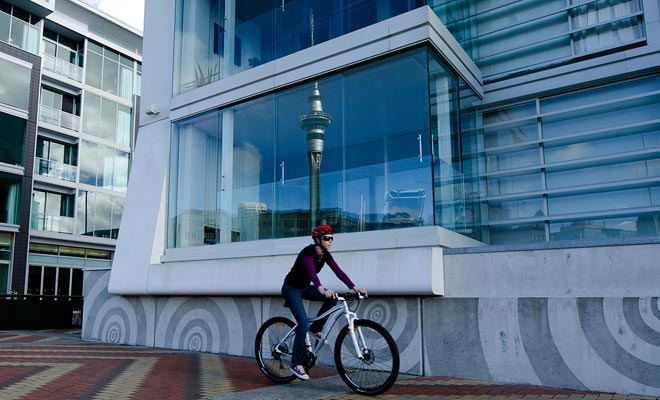
Self-service bicycles exist but are not widely used.
As for cities, Auckland is adapted to bicycle rides, but this is already less evident in Wellington. Dunedin has the World's steepest street in the world, and is more suited to hard-core bikers. You can bring your own bike in New Zealand, provided that it bends and if its weight does not exceed the limit allowed by your airline.
Buying a bike on location is possible, but in any case, make sure you know to change a wheel or repair a chain before considering a long bicycle trip in New Zealand.
Advantages of the bicycle
- Many tracks throughout the country.
Disadvantages of the bicycle
- The weather in New Zealand.
- The hilly or mountainous relief.
- The safety distances rarely respected by drivers.
Is It Possible to Travel on Foot or Hitchhiking?

Hitchhiking is especially interesting for campers.
If you are truly broke, adventurous or both, you may consider a trip with nothing but your legs and a solid backpack.
The 3000 km of the “Te Arararoa” (the great walk in Maori) cover both islands and allows to connect the main attractions. You would sleep in huts where you can meet other travelers sharing the same adventure spirit. Hitchhiking is not as popular as in Europe but is fairly easy except in the regions with low traffic on the road.

In order to cross such a marked terrain, one must be well trained.
This is less the crime rate (low in New Zealand) which is to be feared than the possibility of getting lost in the middle of nowhere, waiting for a car while the rain begins to fall.Sometimes, you might have to wait several hours to be given a lift. To deal with every situation, it is necessary to have your very own camping equipment.
I further recommend travelling with a friend to make this experience more enjoyable.
Advantages of traveling on foot
- Adventure with a capital A.
- The authentic encounters.
Disadvantages of traveling on foot
- Excellent physical condition required.
- Resourcefulness is not an option.
- It often rains in New Zealand.
- The climate of the South Island in winter.
- Hitchhiking is not always possible.
Car or Motorhome?
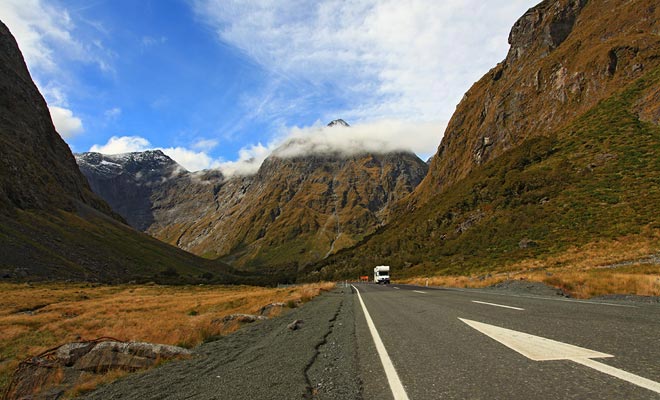
The camper-van can be expensive if you are not planning.
Many of you seem to imagine that a van or a motorhome will solve their budget problem and make possible a stay in New Zealand for a cheap price. But the reality is a bit different...
Compared to a self-drive-tour, the savings one can expect if traveling as a couple are to be counted as hundreds but not in thousands of euros or dollars. But for a family with children, the gain is often far more significant.
However, the total freedom often associated with the camper-van trip is quite illusory in summer. If you do not book your camping grounds in advance, you will have to pay for very expensive parkings or you'll get some fines.
The final rate can approach if not largely exceed the amount you would pay for a car rental with hotel nights.
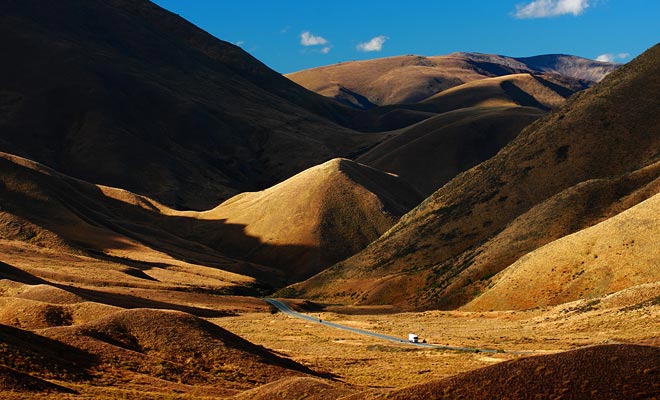
The beauty of the landscape is often beyond imagination.
For first-time visitors, I often recommend the car / hotel solution. Driving on the left is stressful enough for not adding the extra difficulty of maneuvering a large vehicle... but it's up to you!
It often rains in New Zealand, so be careful on the road and watch the speedometer. Accustomed to drive at a 130 km / h speed, Europeans are often spotted by radars and they leave New Zealand with some fines.
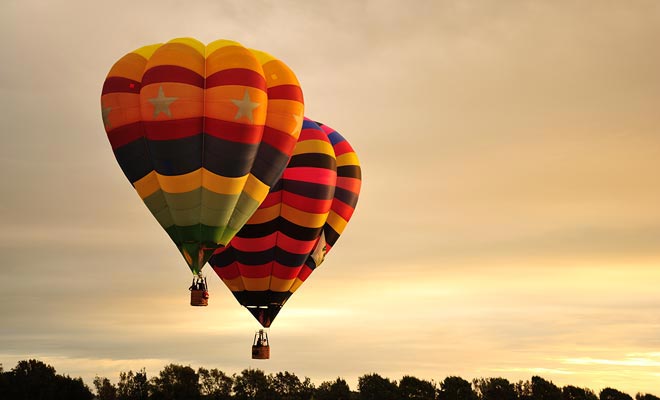
The festivals of hot-air balloons are very popular.
Whatever your decision is, be sure to subscribe a good travel insurance. Most rental companies suggest a “car glass” insurance option, and you should seriously consider taking it.


Questions & Answers.

What can I do for you? Ah the first moments installed in a vehicle with the steering wheel on the right ... If you need some tricks on the subject, I am at your service!
- All topics ... 25 answers in total
- Driving in New Zealand 6 answers
- Travelling by Camper Van 5 answers
- Travelling by Ferry 3 answers
- Travelling by Car 2 answers
- Travelling by Bus 2 answers
- Travelling by Plane 2 answers
- Travelling by Train 2 answers
- Hitchhiking 2 answers
- Accessories 1 answer
Driving in New Zealand
- What is the state of the road network?
The road network is in excellent condition, but there are also many gravel roads. There are no motorways strictly speaking, but speed highways limited to 100 km / h.
- Is it hard to drive left?
If you have never experienced driving on the left side of the road, I recommend you to take your time to familiarize yourself with the vehicle. The first few minutes can be sometimes intimidating. This is a good reason to take the time to drive slowly around the neighborhood before getting into the downtown traffic.
- Is there any traffic congestion?
Only major cities such as Auckland and Wellington experience traffic jams. In the provinces, there is little or no traffic at all in isolated areas.
- Are there any radar controls?
There are many radars on the roads of New Zealand. You will not be the first tourist to be fined for driving at 115 km / h on a speed highway limited to 100 km / h.
- Can we have fines for parking prohibited?
Driving a rental vehicle does not exempt you from paying your fines for parking prohibited. The fine will follow you even to your own country.
- Is gasoline expensive?
Gasoline costs less than in Europe, but the undulating terrain increases the consumption. If you have rented a vehicle with a low-end automatic transmission, you will pay for it at the pump.
Travelling by Camper Van
- Should we prefer the a motorhome or a minivan?
For a short stay, we recommend the camper van. But the debate remains open for a Work Holiday Visa where it may even be advisable to buy an old minivan. Please note that the minivan does not allow to take showers, which limits the autonomy.
- Is it difficult to park a motorhome?
Until you improve your skill (often unfortunately when the journey comes to an end), you will have to ask your co-pilot to get out of the vehicle to guide you.
- How to use the dump stations?
Campsites and some resorts provide dump stations. The maneuver is not difficult.
- Can we shower in a camper?
Unlike minivans, the motorhomes are equipped with a shower that allows to wash with hot water. A treat after a day of hiking.
- Should camping places be booked in advance?
In summer, the reservation of the campsites to park the motorhome is essential. Otherwise, you may have to drive a long time before finding a parking spot nearby.
Travelling by Ferry
- Which ferry company should we borrow?
Two companies share the market: Interislander and Bluebridge. The latter company being slightly cheaper. Interislander nevertheless remains the most famous of the two and the fastest.InterislanderBlue Bridge
- Can the ferry crossing give seasickness?
Given the stability of the ferry, you should not have seasickness. Contrary to popular belief, if you are subject to seasickness, it is recommended taking fresh air on deck rather than stay inside. Be careful not to catch cold, the wind blows strongly in Cook's Strait.
- Why do we have to change vehicles from one island to another?
If you are traveling by car, it is more economical to change your car than to take it on board (it helps the car rental companies who have trouble repatriating their fleet) but you lose precious time! On the other hand, with a motorhome it is another matter and you will have to park the vehicle on board the ferry and pay the supplement.
Travelling by Car
- Should we look for low-cost vehicle rentals?
To answer this question, just ask yourself if you want to visit New Zealand in an old Japanese car that consumes a lot of fuel and poor comfort. Does all this justify a saving of $140 at the end of the stay?
- Can we hire cars with manual gearboxes?
The bulk of the automotive market is made up of vehicles with automatic gear boxes. Rental companies sometimes offer vehicles with manual gearboxes, but this is not the majority.
Travelling by Bus
- Is it recommended travelling by bus?
Bus companies offer profitable loyalty cards if you plan a minimum of trips. A formula that is not economical on a short stay. However, if you do not have a driver's license, the bus will be your only solution to explore the country.
- What are the main bus companies?
Kiwi Experience, Naked Bus or Newmans Coachlines serve the biggest cities and towns in the country. Check their websites for rates and schedules.
Travelling by Plane
- Are domestic flights recommended?
For certain journeys by car, the price of the rental and the accommodation is much higher than a ticket of airplanes. Not to mention the price of the ferry which alone often costs more than the rest. If you can book several months in advance, you will be saving money by borrowing domestic flights.
- What are the local airlines?
Air New Zealand is the most famous airline, competing with low-cost flights from Jet Star and Qantas.Air New ZealandQantasJet Star
Travelling by Train
- Should we travel by train?
The splendid landscapes are a good reason to choose the train to move. But this mode of transport has two major disadvantages. First of all, an unbearable slowness (count 12 hours for a trip between Auckland and Wellington), and a very small number of itineraries. Only a few tourist lines deserve the trip: The Tranzalpine Scenic and Taieri Gorge Railway.Overlander Tranz ScenicTaieri Gorge Railway
- Are train journeys comfortable?
The few commercial lines still in operation are quite comfortable. Some cars are even open so you can admire and photograph the landscape. Even so, the slowness of this type of locomotion can be boring, especially the children.
Hitchhiking
- Can we cross the country on foot?
The trail Te Araroa crosses the country from north to south over nearly 3000 km. The route has been specially designed to pass through the main attractions of the country. If you have energy to spare and a good dose of courage, this will undoubtedly be the greatest adventure of your life.Te Araroa
- Is it safe to travel by hitchhiking?
Getting around by hitchhiking is not a risk in New Zealand, whether you are traveling as a couple or alone. Unattached people are never immune to a bad encounter, even if the crime rate remains particularly low.
Accessories
- What is the maximum speed allowed on the road?
In cities, the limitations are the same as in Europe with a maximum authorized speed of 50 km / h. Outside agglomerations, the speed is limited to 100 km / h. There are many radars on the roads of New Zealand. You will not be the first tourist to be fined for driving at 115 km / h on a speed highway limited to 100 km / h. Driving a rental vehicle does not exempt you from paying your fines for parking prohibited. The fine will follow you even to your own country.

